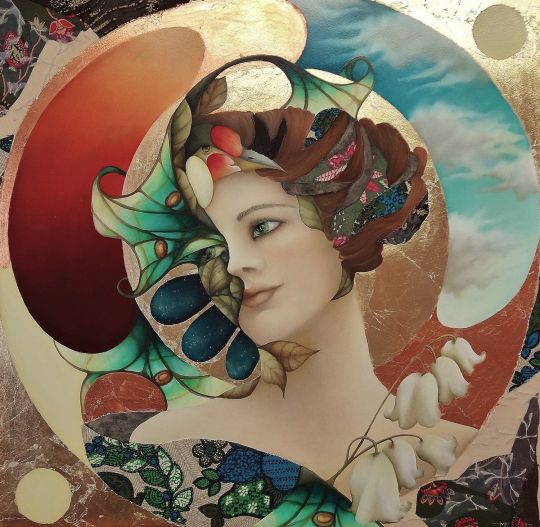#Bouillé
Photo
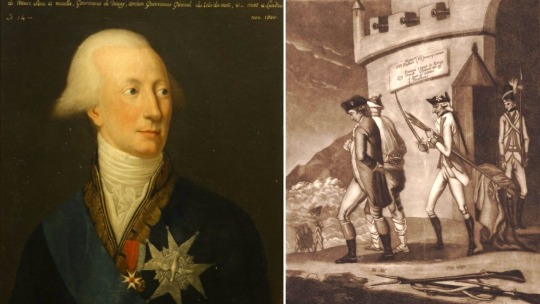
26 novembre 1781 : François de Bouillé enlève l’île de Saint-Eustache aux Anglais ➽ http://bit.ly/Prise-Saint-Eustache Observant la marche des Anglais qui en février précédent s’étaient emparé non sans déprédations de l’île hollandaise de Saint-Eustache, François de Bouillé, gouverneur de la Martinique, fait secrètement voile avec quelques centaines d’hommes vers la possession anglaise et y parvient dix jours plus tard à la nuit tombée
#CeJourLà#26Novembre#Ile#SaintEustache#Marquis#Bouillé#Gouverneur#Martinique#Antilles#Hollandais#Anglais#Français#Guerre#Indépendance#ÉtatsUnis#Hollande#Angleterre#France#Attaque#Maritime#Terrestre#Mer#Frégates#Armée#Troupes#histoire#france#history#passé#past
16 notes
·
View notes
Text
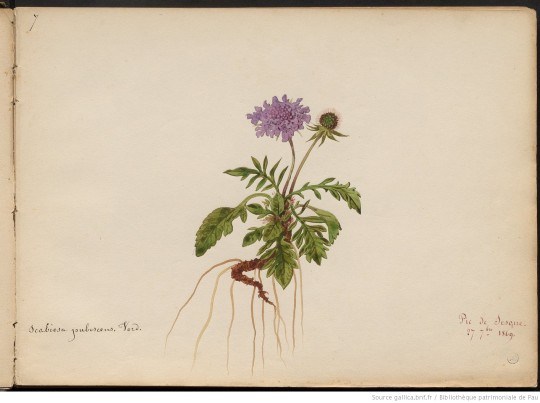
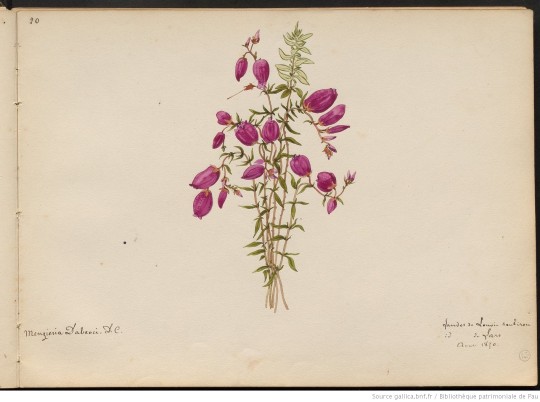
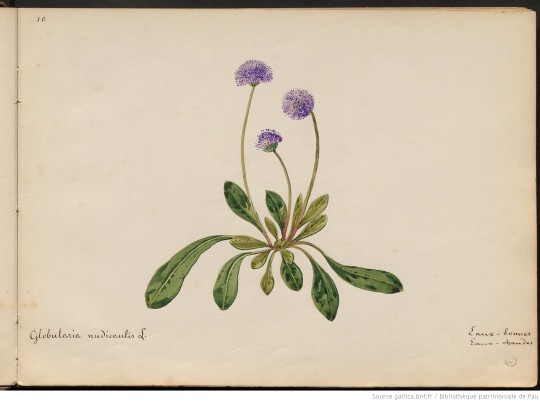
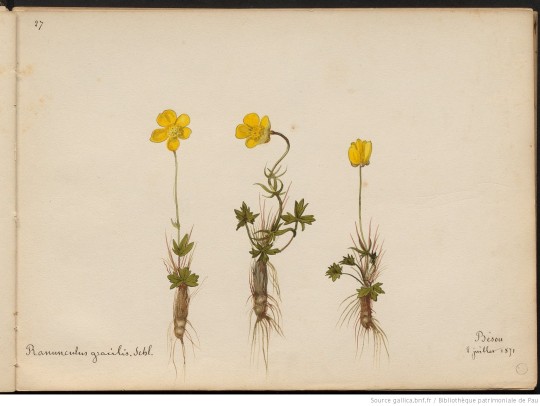
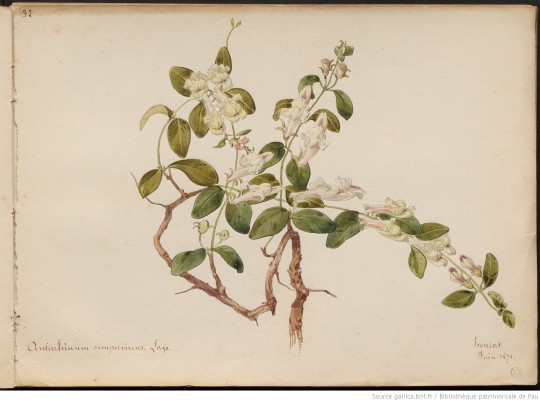
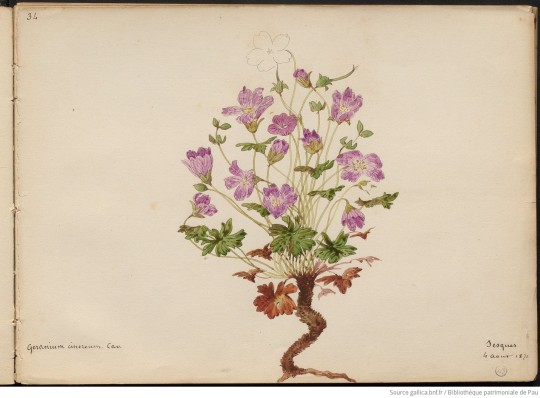

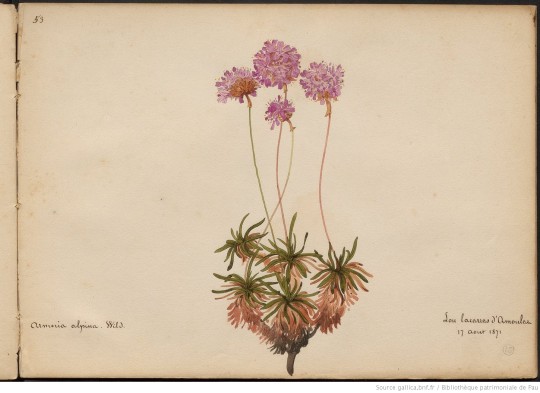
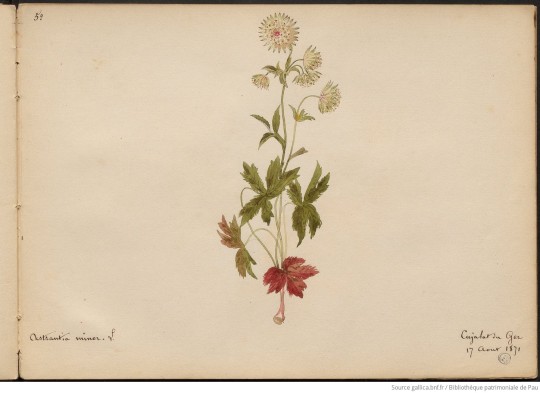

Botanical studies in watercolour taken from 'Album de dessins aquarellés et numérotés sur la flore et la faune des Pyrénées' (1869-1871) by Roger de Bouillé.
Bibliothèque patrimoniale de Pau.
470 notes
·
View notes
Text

The Quai de Versailles is a quay in the city of Nantes, France. The quay is located in the Hauts-Pavés - Saint-Félix district, on the right bank of the Erdre, between Rue Paul-Bellamy and Boulevard Amiral-Courbet. The northern portion of the quay is bordered by the Île de Versailles. It successively meets the Place Châteaubriand, then the Rue de Bouillé, the Rue de Châteaulin and the Rue de Barbin.
19 notes
·
View notes
Text
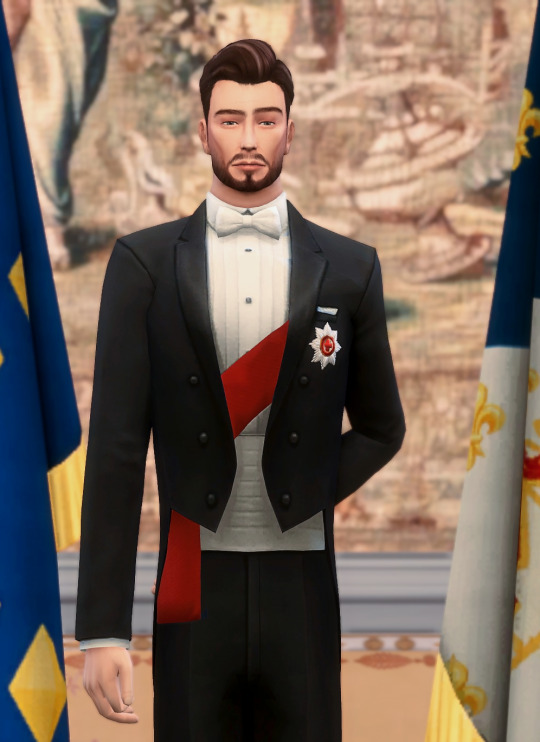
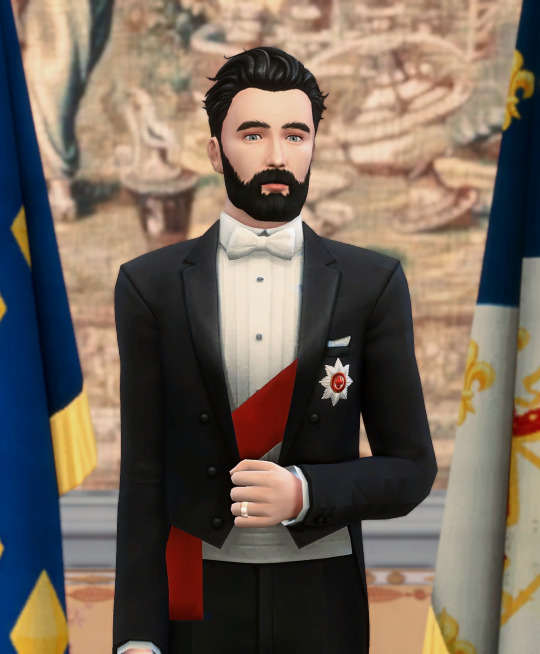


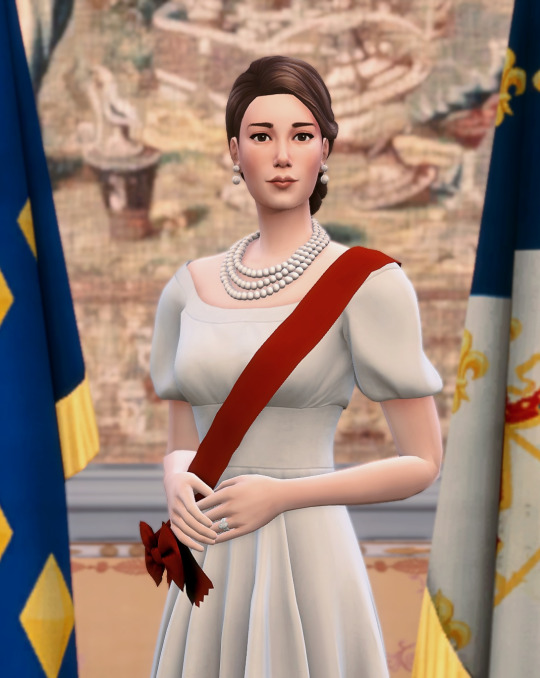

Session of the new State Council in Compiègne
His Majesty the Emperor Napoléon V has today formed his first Council of State. The Conseil d'Etat is composed of members chosen by the Emperor to advise him and represent him officially in French institutions. It also has the task of drafting the bills of the executive power.
1st Council of State of His Imperial Majesty, Emperor Napoléon V of the French
His Imperial Highness, Imperial Prince Henri of the French
His Serene Highness, Prince Joachim Murat de Francesim
Monsieur le Duc, Duke Casimir de Rochechouart de Mortemart
Marquis Grégoire de Moustier
Countess Elise de Bouillet du Chariol
Order of the day: Preparation of the coronation of His Majesty

Communiqué - Sobriety isn't on the agenda. The Council of State is planning a "grand coronation" according to the Crown spokesman.
"The whole day will be filmed live for TV around the world. It will begin at nine o'clock with the imperial procession. The ceremony will last five hours and will be attended by thousands of guests." To keep the tradition alive, there will be a cannon and balcony salute, a military parade, an imperial carriage...
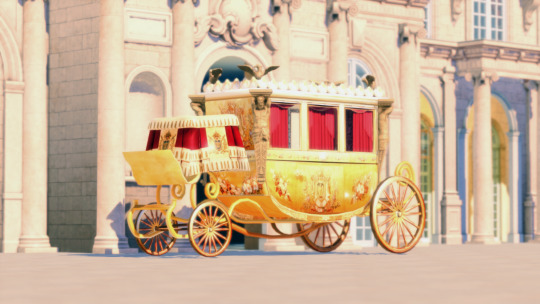
Details of the outfits worn by the Emperor and his family have not yet been released, nor the identity of the guests. It will probably be the pope and godfather of the Emperor, Gregorius XIX, who will officiate at the coronation. On this occasion, the Pope will offer Catholic relics to the new monarch.
In a survey, more than 80% of French people seem to be looking forward to the coronation and the festivities. The week of the coronation will be a public holiday for the festivities, with many events and concerts.
Traduction française
Sa Majesté l'Empereur Napoléon V a formé aujourd'hui son premier Conseil d'Etat. Le Conseil d'Etat est composé de membres choisis par l'Empereur pour le conseiller et le représenter officiellement auprès des institutions françaises. Il a également la mission de rédiger les projets de loi du pouvoir exécutif.
1er Conseil d'Etat de Sa Majesté Impériale, l'Empereur Napoléon V des français
Son Altesse Impériale, le prince impérial Henri des Français
Son Altesse Sérénissime, le Prince Joachim Murat de Francesim
Monsieur le Duc, le Duc Casimir de Rochechouart de Mortemart
Le comte Grégoire de Moustier
La comtesse Elise de Bouillé du Chariol
Ordre du jour : Pr��paration du couronnement de Sa Majesté
Communiqué - La sobriété n'est pas au programme. Le Conseil d'Etat envisage un "couronnement grandiose" selon le porte-parole de la Couronne.
"Toute la journée sera filmée en direct pour les télévisions du monde entier. Elle commencera à neuf heures avec le cortège impérial. La cérémonie durera cinq heures et accueillera des milliers d'invités." Pour faire survivre la tradition, la salve des canons, une parade militaire, le salut au balcon, le carrosse impérial ou encore la jetée de quinaires seront de mise.
Le détail des tenues portées par l'Empereur et sa famille n'est pas encore communiqué, ni l'identité des invités. Ce sera probablement le pape et parrain de l'Empereur, Grégoire XIX, qui officiera le sacre. A cette occasion, le pape offrira des reliques catholiques au nouveau monarque.
Dans une enquête, plus de 80% Français semblent impatients d'assister au couronnement et aux festivités. La semaine du couronnement sera fériée pour les réjouissances, et accueillera de nombreux événements et concerts.
#simparte#communiqué#coronation#gen 2#council of state#sims 4#ts4#sim : henri#sim : casimir#sim : grégoire#sim : joachim#sim : bouillet#ts4 royal#ts4 royals#ts4 royal legacy#ts4 royal simblr#ts4 royalty#sims 4 royal story#sims 4 royal#sims 4 royalty
50 notes
·
View notes
Text
Another description of Joseph Bonaparte
This is from the memoirs of one Marquis Louis de Bouillé, who would later serve as chief-of-staff to general Sebastiani in Spain. The evaluation of Joseph Bonaparte, however, already goes back to 1806, when Joseph was made King of Naples in a campaign under the command of marshal Masséna.
King Joseph, in command of this army, had never served; he was wearing for the first time the habit of a general and nearly also a uniform, and he had not, like another Lucullus, learned war by going to the army. He added, to the absolute inexperience of the profession of arms, as much vacillation in his ideas, as much variation in his projects, as much uncertainty in his will, as his brother has of steadfastness and firmness in his. Nothing in his exterior made up for his essential defects: his air, his bearing, his manners did not have anything that imposes on men and that, in a prince especially, replaces, in the eyes of the troops, talent. He had, moreover, with him and in his confidence, no one who could direct him, and all that surrounded him, especially when he began this campaign, was as foreign as he was to the army, to its developments and to military knowledge.
Bouillé then goes on about how Gouvion St.-Cyr would have been the ideal candidate as a mentor for Joseph, and how for whatever reason Napoleon instead chose César Berthier, whom Bouillé regarded as incompetent and a ridiculous figure, and a disgruntled Masséna who had just fallen in disgrace with Napoleon due to ... financial matters of the not-so-legal variety, and thus was really not in the mood to overexert himself.
And just for the record and to put things in perspective: Bouillé seems to like very few people. He dislikes Joseph, César Berthier, Masséna, Soult of course (repeating every malicious rumour about him, though the two occasions when he had to deal with him in person seem to have gone over rather well), while he seems to be somewhat fond of Lefebvre he greatly critisizes his capacities ans commander, he dislikes Jourdan, but most of all he despises his immediate superior, general Sebastiani. So Joseph has much company.
38 notes
·
View notes
Photo
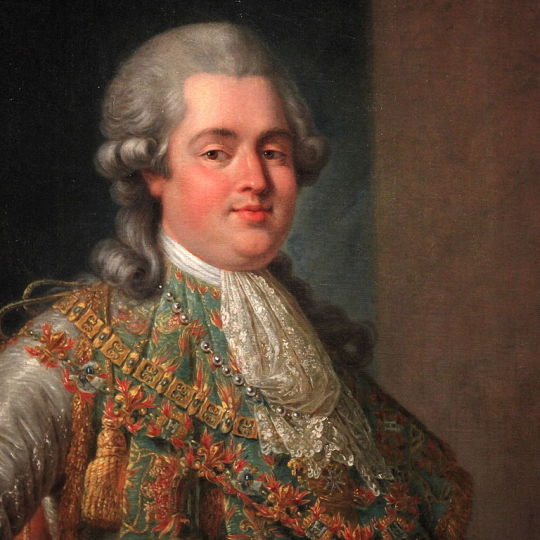
From the memoirs of Louis de Bouillé, on the comte de Provence being told about the royal family's capture after their flight from Paris:
"He listened with an imperturbable calm, an impassive coldness, fro which he only emerged to ask me a few vague questions and from which I was no less revolted than surprised. I do not know if, as he says in his Relation, his tears "which had not been able to flow in the first instant had come to relieve him" before my arrival, but what I can assure you is that we saw no trace of it in his eyes, perfectly dry like his heart, and that only their usual expression of falsity could be noticed, through which escaped some spurts of treacherous satisfaction.
#french history#french revolution#18th century#louis xvi#louis xviii#quotes#this combined with the Fersen/balbi/etc meeting#and the letter to MA suggesting that Louis XVI sign off on giving Provence and then if he was incapacitated Artois the regency#suspicious as fuck
43 notes
·
View notes
Link
0 notes
Text
youtube
The Song of Marseille
Arise, children of the Fatherland,
The day of glory has arrived!
Against us tyranny
Raises its bloody banner
Do you hear, in the countryside,
The roar of those ferocious soldiers?
They're coming right into your arms
To cut the throats of your sons and women!
To arms, citizens,
Form your battalions,
Let's march, let's march!
Let the impure blood
Water our furrows!
What does this horde of slaves,
Of traitors and conjured kings want?
For whom are these vile chains,
These long-prepared irons?
Frenchmen, for us, ah! What outrage!
What fury must it arouse!
It is us they dare plan
To return to the old slavery!
To arms, citizens,
Form your battalions,
Let's march, let's march!
Let the impure blood
Water our furrows!
What! Foreign cohorts
Would make the law in our homes!
What! These mercenary phalanxes
Would strike down our proud warriors!
Great God! By chained hands
Our brows would yield under the yoke
Vile despots would have themselves
The masters of our destinies!
To arms, citizens,
Form your battalions,
Let's march, let's march!
Let the impure blood
Water our furrows!
Tremble, tyrants and you traitors
The shame of all parties,
Tremble! Your parricidal schemes
Will finally receive their reward!
Everyone is a soldier to fight you
If they fall, our young heroes,
The earth will produce new ones,
Ready to fight against you!
To arms, citizens,
Form your battalions,
Let's march, let's march!
Let the impure blood
Water our furrows!
Frenchmen, as magnanimous warriors,
Bear or hold back your blows!
You spare those sorry victims,
Who arm against us with regret.
But not these bloodthirsty despots,
These accomplices of Bouillé,
All these tigers who, mercilessly,
Rip their mother's breast!
To arms, citizens,
Form your battalions,
Let's march, let's march!
Let the impure blood
Water our furrows!
Sacred love of the Fatherland,
Lead, support our avenging arms
Liberty, cherished Liberty,
Fight with your defenders!
Under our flags, shall victory
Hurry to thy manly accents,
That your expiring enemies,
See your triumph and our glory!
To arms, citizens,
Form your battalions,
Let's march, let's march!
Let the impure blood
Water our furrows!
We shall enter the (military) career
When our elders are no longer there,
There we shall find their dust
And the trace of their virtues
Much less keen to survive them
Than to share their coffins,
We shall have the sublime pride
Of avenging or following them
Children, let Honour and Fatherland
be the object of all our wishes!
Let us always have souls nourished
With fires that might inspire both
Let us be united! Anything is possible;
Our vile enemies will fall,
Then the French will cease
To sing this fierce refrain:
To arms, citizens,
Form your battalions,
Let's march, let's march!
Let the impure blood
Water our furrows!Merci ! ❤
https://lyricstranslate.com
0 notes
Photo
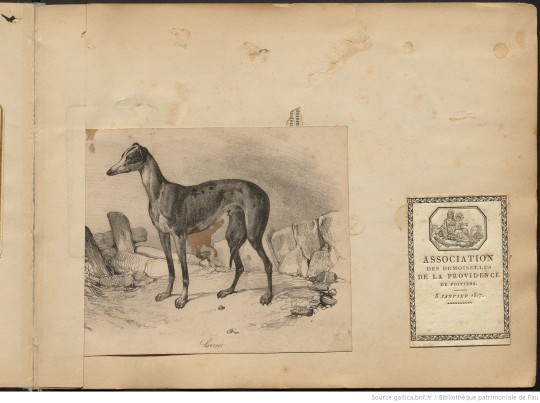
Collections par Roger de Bouillé
le #lévrier - Association de Damoiselle de la Providence
8 janvier 1817
the #sighthound #bulletin
0 notes
Text
Couplet n°1
Allons enfants de la Patrie,
Le jour de gloire est arrivé !
Contre nous de la tyrannie,
L’étendard sanglant est levé, (bis)
Entendez-vous dans les campagnes
Mugir ces féroces soldats ?
Ils viennent jusque dans vos bras
Égorger vos fils, vos compagnes !
Refrain
Aux armes, citoyens,
Formez vos bataillons,
Marchons, marchons !
Qu’un sang impur
Abreuve nos sillons !
Couplet n°2
Que veut cette horde d’esclaves,
De traîtres, de rois conjurés ?
Pour qui ces ignobles entraves,
Ces fers dès longtemps préparés ? (bis)
Français, pour nous, ah ! quel outrage
Quels transports il doit exciter !
C’est nous qu’on ose méditer
De rendre à l’antique esclavage !
Couplet n°3
Quoi ! des cohortes étrangères
Feraient la loi dans nos foyers !
Quoi ! ces phalanges mercenaires
Terrasseraient nos fiers guerriers ! (bis)
Grand Dieu ! par des mains enchaînées
Nos fronts sous le joug se ploieraient
De vils despotes deviendraient
Les maîtres de nos destinées !
Couplet n°4
Tremblez, tyrans et vous perfides
L’opprobre de tous les partis,
Tremblez ! vos projets parricides
Vont enfin recevoir leurs prix ! (bis)
Tout est soldat pour vous combattre,
S’ils tombent, nos jeunes héros,
La terre en produit de nouveaux,
Contre vous tout prêts à se battre !
Couplet n°5
Français, en guerriers magnanimes,
Portez ou retenez vos coups !
Épargnez ces tristes victimes,
À regret s’armant contre nous. (bis)
Mais ces despotes sanguinaires,
Mais ces complices de Bouillé,
Tous ces tigres qui, sans pitié,
Déchirent le sein de leur mère !
Couplet n°6
Amour sacré de la Patrie,
Conduis, soutiens nos bras vengeurs
Liberté, Liberté chérie,
Combats avec tes défenseurs ! (bis)
Sous nos drapeaux que la victoire
Accoure à tes mâles accents,
Que tes ennemis expirants
Voient ton triomphe et notre gloire !
Couplet n°7
Nous entrerons dans la carrière
Quand nos aînés n’y seront plus,
Nous y trouverons leur poussière,
Et la trace de leurs vertus, (bis)
Bien moins jaloux de leur survivre,
Que de partager leur cercueil,
Nous aurons le sublime orgueil,
De les venger ou de les suivre

1 note
·
View note
Photo
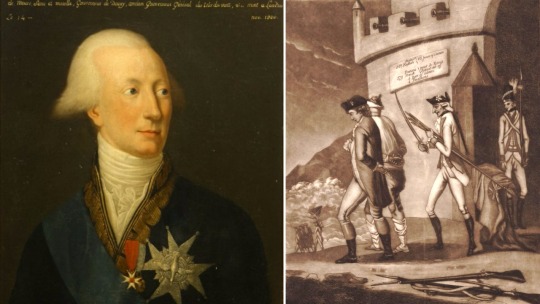
26 novembre 1781 : François de Bouillé enlève l’île de Saint-Eustache aux Anglais ➽ https://j.mp/3GraGRL Observant la marche des Anglais qui en février précédent s’étaient emparé non sans déprédations de l’île hollandaise de Saint-Eustache, François de Bouillé, gouverneur de la Martinique, fait secrètement voile avec quelques centaines d’hommes vers la possession anglaise et y parvient dix jours plus tard à la nuit tombée
#CeJourLà#26Novembre#Ile#SaintEustache#Marquis#Bouillé#Gouverneur#Martinique#Antilles#Hollandais#Anglais#Français#Guerre#Indépendance#ÉtatsUnis#Hollande#Angleterre#France#Attaque#Maritime#Terrestre#Mer#Frégates#Armée#Troupes#histoire#france#history#passé#past
3 notes
·
View notes
Text

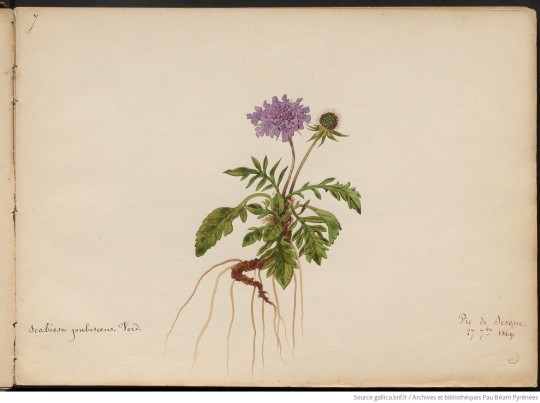

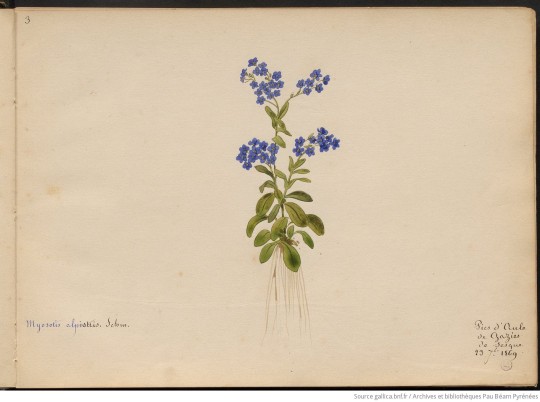
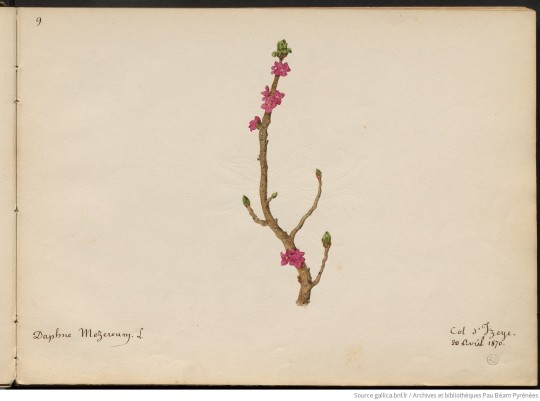
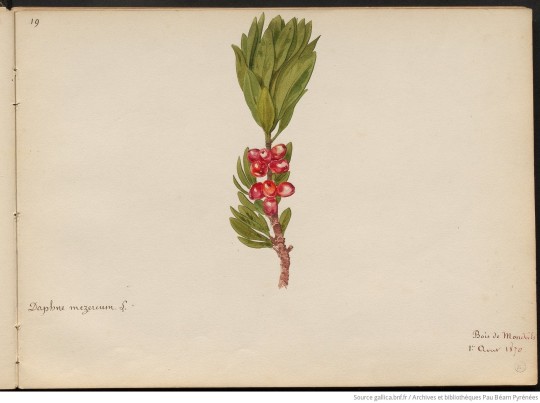


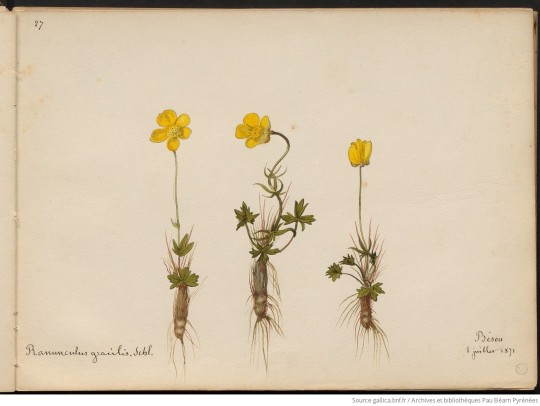
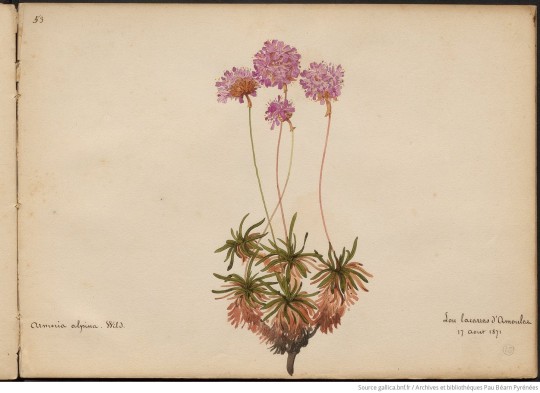
Botanical studies in watercolour taken from 'Album de dessins aquarellés et numérotés sur la flore et la faune des Pyrénées' (1869-1871) by Roger de Bouillé.
Archives et bibliothèques Pau Béarn Pyrénées.
324 notes
·
View notes
Photo

“Une émeute se produit à Rouyn,” La Gazette du Nord [Québec]. May 6, 1932. Page 1.
---
Les communistes veulent faire une démonstration. — Coups de feu.
----
Dimanche dernier, une véritable émeute a caractérisé la célébration du premier mai pour les communistes de Noranda et de Rouyn, qui ont voulu faire une grande manifestation de protestation contre les autorités du pays et contre les moyens adoptés pour venir en aide aux chômeurs.
Vers deux heures, dimanche après-midi, environ 400 communistes se réunirent dans la salle ukrainienne, à Rouyn, pour organiser une grande parade dans les rues. Le chef de police Lapointe, de Rouyn, le chef de police Perrault, de Noranda, et le constable Audette, de la gendarmerie à cheval, avec le concours de plusieurs citoyens leur, ordonnèrent de se disperser. Au lieu d’obéir, les communistes tirèrent sur la police des coups de fusils et de revolvers et lui lancèrent des pierres et autres projectiles.
Le chef de police Lapointe reçut une balle dans le bras gauche et fut frappé à la figure par une femme. Le constable Audette a été aussi blessé à la tête par une pierre qui lui fit une large entaille. Plusieurs citoyens ont également reçu de légères blessures. Parmi les communistes, il y eut plusieurs blessés. Les pompiers furent alors appelés et lancèrent sur les manifestants de nombreux jets d’eau qui les dispersèrent. Quatre hommes et une femme ont été arrêtés.
Le chef Lapointe et le constable Audette ont été pansés à l’hôpital par le Dr. J.-I. Bouillé. Ils purent retourner dans leur famille après avoir subi un examen aux rayons X.
Notre correspondant de Rouyn nous assure que la blessure du chef Lapointe n’est pas grave. On se demande, d’ailleurs, si la balle qui l’a blessé n’a pas été tirée par maladresse par un policier.
La police provinciale fait enquête depuis dimanche.
#rouyn#noranda#riot#may day#political demonstration#protest march#communists#communism#unemployed association#unemployed protest#shooting a policeman#throwing stones#communist party of canada#breaking up a demonstration#law and order politics#law and order in canada#great depression in canada#northern québec#émeute#police violence
1 note
·
View note
Photo
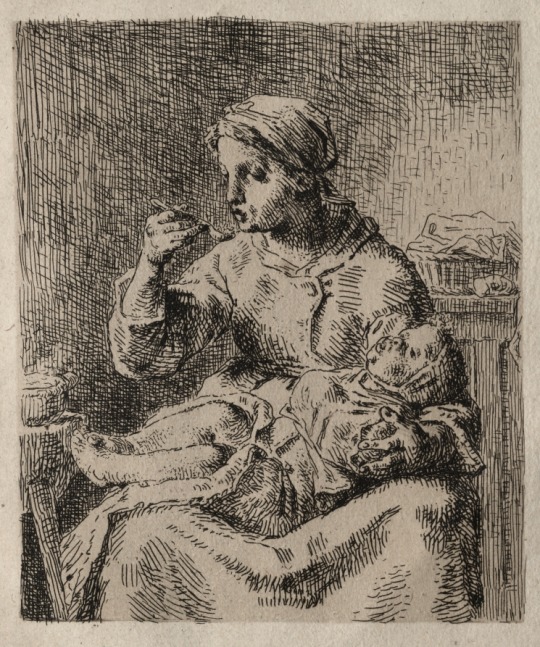
La Bouillée, Jean-François Millet, Cleveland Museum of Art: Prints
Medium: etching
https://clevelandart.org/art/1922.144
6 notes
·
View notes
Text
Louise Amour Marie Bouillé, later marquise of Rambures, by Ignacio de Medrano (Prado Museum, Madrid, Spain)
The painting:
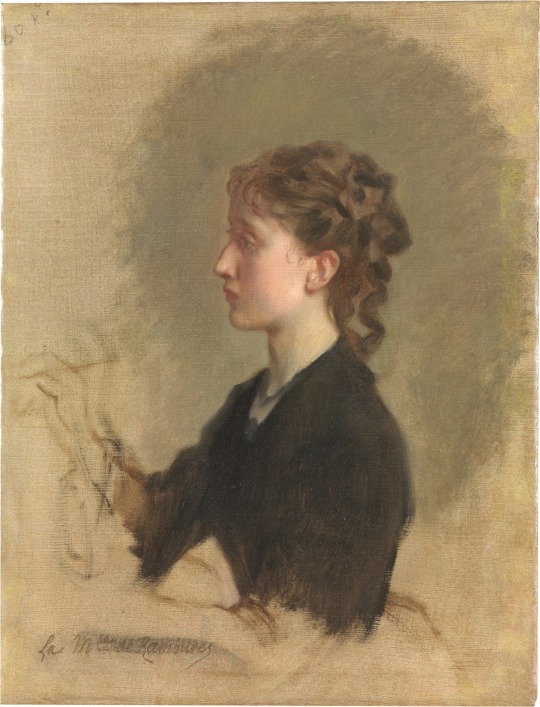
About the painting:
Louise Amour Marie de Bouillé, born in 1844, married in 1864 the French Count Charles Antoine de La Roche-Fontenilles, who also used the title of Marquis of Rambures.
This portrait is absolutely unique in Madrazo’s work, as it offers an intermediate stage between the sketch and the finished portrait. It was more tan probably done in a single, short session, and intended to be gifted to the model herself.
She appears sitting, almost, but not quite, in profile, ready to start painting. Her face is drawn with just a few, subtle strokes; the delicate coloring emphasized the elegance and languor of her features. This effective use of colour, in conjunction with the soft lighting, contributes to the overall intimate and private feel of the whole painting.
Here you can appreciate a close-up of how subtle the lighting and overall flesh colour: look at her cheeks
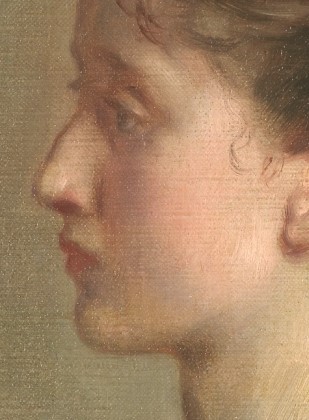
In this close-up, you can appreciate just how few strokes were necessary for him to give “life” to her hair:
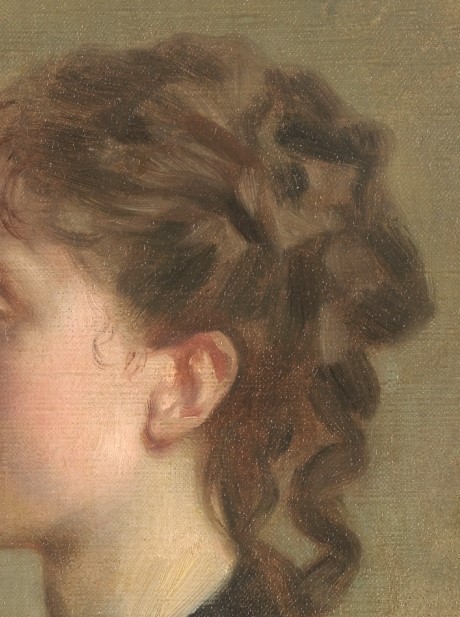
About the Author:
Federico de Madrazo y Kuntz (9 February 1815 – 10 June 1894) was a Romantic Spanish painter.
From a family with artists on both sides, he studied in Madridm the the Real Academia de Bellas Artes de San Fernando, and then went to Paris to study with Ingres (a friend of his father) and where he entered into contact with French Romanticism. He also stayed in Rome for two years, before returning to Spain.
He was the Court Painter for Queen Isabel II, and was later director of the Prado Museum and of the Real Academia de Bellas Artes de San Fernando.
I just wanted to highlight that he has some very famous portraits (his specialty) such as the Portrait of María Amalia del Llano y Dotres, 1st Countess of Vilches.
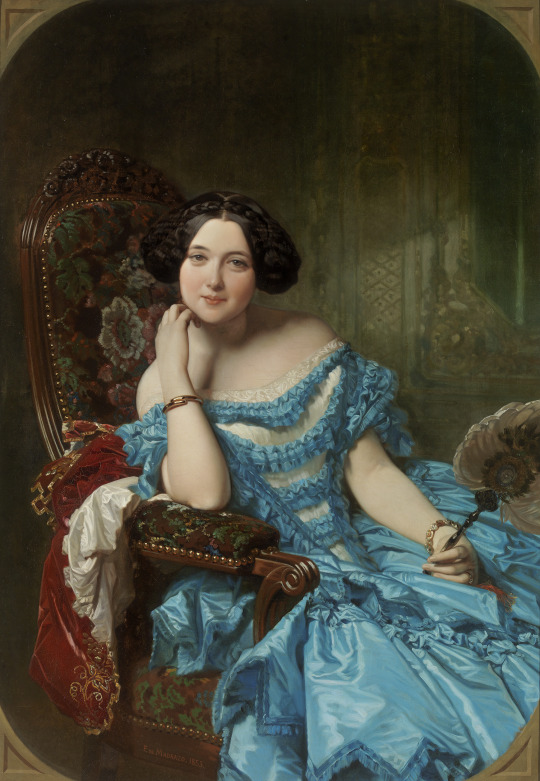
#study notes#studyblr#Study resources#studyspo#studyinspo#art#romanticism#spanish painter#lifelong learning#LifeLongLearning#justalifelonglearner
8 notes
·
View notes
